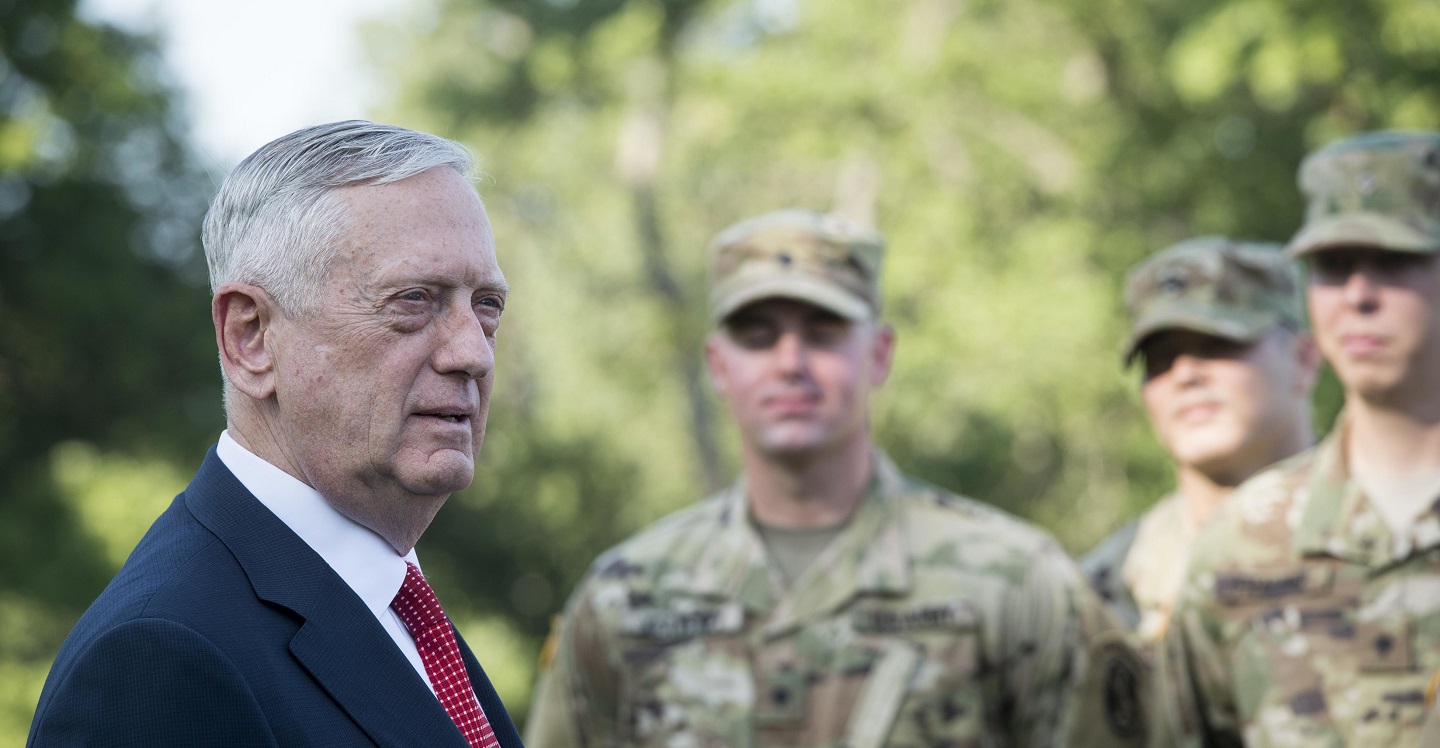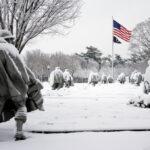
But what might the process of civilianizing mean, and what are the results? What is being gained, and what is being lost? What, in short, distinguishes the civilian from the military?
Currently, U.S. law requires that a former military officer must be retired from active duty for a minimum of seven years before she or he may become Secretary of Defense. The role was designated by the National Security Act of 1947 as a key part of civilian control of the military. Hence, there must be something about “civilianizing” that takes at least seven years before it is appropriate for a person with a career background in military service to take on the role of second in the civilian chain of command over the armed forces. But what might the process of civilianizing mean, and what are the results? What is being gained, and what is being lost? What, in short, distinguishes the civilian from the military?
In our national conversation about civil-military relations the term “civilian” is, as the academics would say, “underspecified.” Samuel Huntington observed in The Soldier and the State that although the bounds of the military identity are well defined, to be a civilian simply means than one is not a member of the military. Although we have a strong sense of civilians’ rank and role vis-à-vis the military in a democracy (civilians, as a group, control the military and therefore “outrank” them in an institutional sense), civilians do not comprise a profession in the way the military does, and therefore do not carry with them certain standards of conduct and expertise. Civilians are so diverse in their backgrounds, views, and responsibilities—and so numerous in comparison to the small number of those who serve in the military—that lumping them together for analytical purposes is only useful as a contrast to service in uniform.
But what makes a “civilian” in the civil-military enterprise is as important today as it has ever been, because the value of civilian control of the military is increasingly in question. Not only does the American public rate its confidence in the military higher than for any civilian arm of government, but military officers themselves increasingly wonder aloud about what Peter Feaver calls “McMasterism”— the notion that senior military leaders have the right and the responsibility to oppose civilian policy guidance they find unwise in their own professional judgment.
The current phenomena of public trust in the military and military distrust of civilian leaders are nowhere more evident than the debates that still rage over the identity and status of James Mattis, President Trump’s first Secretary of Defense and a retired four-star Marine Corps general. From the tendency of people to refer to him as “General” instead of “Secretary” to his insistence that he is following professional military etiquette in not commenting on Trump administration policies, his case begs a series of questions: Is a formal and legalistic break from the responsibilities of military service sufficient to make one a civilian? Or is there more to being a civilian than simply not being in the military? Are there skills, values, habits, or abilities implicated by a civilian identity? Is being a civilian a legal, professional, or cultural designation? In the defense context, does one become a civilian according to certain standards of experience and expertise?
These are important questions to answer if we want to evaluate the democratic balance of power between the civilian institutions of government and the armed forces. We also need to know whether there is something about senior civilians’ backgrounds or abilities that confers on them not just the constitutional right but also the capacity to control the professional activities of their uniformed colleagues.
First, it is important to distinguish between types of civilians—and, relatedly, between levels of analysis. The “civilian” in civil-military relations at the policymaking level connotes particular individuals occupying specified roles in the administration and guidance of, and the budgeting for, the military services and the defense enterprise. These roles appear formally in Title 10 of the U.S. Code, but also in civilian institutions, most notably the National Security Council, the Office of the Secretary of Defense, and the Congress with its relevant committees. Such civilians are not simply those who are not members of the armed services; they have roles and responsibilities that involve them in the civil-military relations of policymaking.
Indeed, political experience is as close to a standard for higher office as there is.
Moreover, the civilians who are qualified to play a role in defense policy are a subset of the overall civilian population. While being a non-military, politically appointed government leader with (at least partial) responsibility for managing military matters may not make one part of a formalized profession, it is ideally associated with experience and expertise in both defense issues and domestic politics. There are discernable patterns in achievement and experience among those historically appointed not only to the cabinet, deputy, and undersecretary ranks at the Department of Defense, but also the National Security Advisor, White House Chief of Staff, and the members of House and Senate armed services committees. These men and women tend to hail from legal, business, or political backgrounds. Indeed, political experience is as close to a standard for higher office as there is. Leon Panetta, who served as Secretary of Defense, was professionally steeped in politics and the machinations of Washington bureaucracies from the beginning of his career. A political science major and a lawyer, he worked as a junior appointee in the Nixon administration and went on to be a Congressman and then Director of the Office of Management and Budget for President Clinton. The first White House Chief of Staff was an academic before joining the U.S. Conciliation Service, and later the Labor Department. Others were career political campaign staffers, like Kenneth O’Donnell, or businessmen, like H.R. Haldeman. Many of these men had military careers prior to their political lives, but on average their service was brief and their experience in law, business, academia, and especially politics was much deeper.
It is true that the range of backgrounds considered good preparation for these jobs is broader than the experience garnered by military service; but that is part of the value that civilians bring to their roles in defense and national security policymaking. Careers that prepare one for public office tend to fall under the categories of social science, law, and management. These are people who spend their lifetimes being educated in and practicing how societies and public institutions should be organized and resourced. They know about balancing extremely diverse interests, public relations, and personal relationships. They know about power not just in a material sense, but also in a social one.
Civilians inhabit the world of professional politics. And politics, as Clausewitz told us, provides the purposes for military action. In a democracy, the distinction between politically active civilians and apolitical administrative functions is by design. For no arm of the executive branch in the United States is this division between politics and administration more important than for the military. That is the reason a fundamental professional standard for the American armed forces is to be non-partisan, neutral to the political interests of those in the National Command Authority, the Congress, and society as a whole. Civilians in positions of political power are not only free to adjudicate among factional domestic agendas, they are responsible for doing so in order to channel political will into military policy. Should they fail to do so, the consequences are their responsibility, not the professional military’s.
Politics therefore comprises a civilian’s core knowledge base and skill set and separates civilian from military expertise. To argue that management of a hierarchical bureaucracy regulated by the Uniform Code of Military Justice scales up to political roles is to elide the differences between military technocratic administration and political leadership. A good politician may also be a good technocrat, but excellence in managing a bureaucracy does not automatically lend itself to excellence as a politician, for the bureaucrat defends a narrow set of expertise and interests, while the politician knows how to create equilibrium among many such priorities.
Operating politically is also not a career that allows for shortcuts to achieve true expertise. Although the barriers to entry in political roles can be less systematic than those imposed on military officers, many the most effective senior politicians earned their seniority by living through countless hours of budget negotiations, personnel decisions, political campaigns, constituent services and meetings, debates, speeches, testimony, fundraising, balancing favors and interests, giving media interviews, and the sundry other necessities of survival in the political arena. Political appointees coming from a technocratic background, such as the current Secretary of Defense, may have climbed the rungs of bureaucracies and corporations. Much like the military officer, a senior political official has seen the full spectrum encompassed by her profession; she has succeeded and failed and learned a great a deal from the fight. In short, the civilian cannot transform into a competent military officer overnight, but the military officer similarly cannot transmogrify into a politician mere months after retirement.
A century ago, sociologist and economist Max Weber wrote that politics is a vocation. Being a civilian in the civil-military relationship connotes not only the principle of civilian control, but also expertise that complements and guides that provided by professional military advice. The “civilian” in the policy-relevant civil-military relationship is therefore neither a mere functionary nor a neophyte whose judgment needs to be affirmed by a sort of military peer review. The civilian represents the expertise of another professional group—more diffuse, perhaps, and less systematically commissioned, but real and not only relevant to the legitimate policymaking process but essential to it. Civilians across the defense, diplomatic, intelligence, and legislative enterprises may not comprise a single profession like military officership. But the experience, skills, knowledge, and vision that civilians bring to their politically enabled roles in the civil-military relationship provide the military profession the context in which it is called to serve.
Alice Hunt Friend is a Visiting Research Professor at the U.S. Army War College’s Strategic Studies Institute and a Senior Fellow at the Center for Strategic and International Studies. The views expressed in this article are those of the author and do not necessarily reflect those of the U.S. Army War College, the U.S. Army, or the Department of Defense.
Photo Description: Defense Secretary Jim Mattis talks with members of the 3rd U.S. Infantry Regiment, also known as The Old Guard, during a re-enlistment ceremony at Joint Base Myer-Henderson Hall, Va., Sept. 20, 2017.
Photo Credit: DoD photo by Air Force Tech. Sgt. Brigitte N. Brantley





After my eight years in the military (military college, active duty and reserves), I decided enough was enough. Certainly we need those who do make a career of it, and thankfully they do not have the last word on the use of our armed forces. While generals and admirals say they abhor war, it is a fact that absent any prospects of it, they would be looking for work. One could employ the analogy that career military people see all problems as nails, and they are the hammer. So they prepare for war, and preparation requires money and manpower, not to mention the political consensus to obtain them. Civilian control of the military is therefore a balancing act, and in times of crisis the tilt is often toward the military. When the crisis passes, the pendulum swings back. Our system works, albeit slowly and sometimes after-the-fact.
Consider the alternative: a professional military that always has the last word. Would it be as likely to seek peaceful paths, or would the hammer-and-nail analogy come into play? Civilians with control over policies and budgets might seem to be running a show they do nnot understand or appreciate, but one is reminded of Winston Churchill’s definition of a democracy: the worst form of government, except for all the others.
What makes a Civilian?
For answer, I refer the Reader to Kipling’s poem, “The Heathen”-
The ‘eathen in ‘is blindness bows down to wood an’ stone;
‘E don’t obey no orders unless they is ‘is own;
‘E keeps ‘is side-arms awful: ‘e leaves ’em all about,
An’ then comes up the Regiment an’ pokes the ‘eathen out.
All along o’ dirtiness, all along o’ mess,
All along o’ doin’ things rather-more-or-less,
All along of abby-nay, kul, an’ hazar-ho,
Mind you keep your rifle an’ yourself jus’ so!
The young recruit is ‘aughty — ‘e draf’s from Gawd knows where;
They bid ‘im show ‘is stockin’s an’ lay ‘is mattress square;
‘E calls it bloomin’ nonsense — ‘e doesn’t know, no more —
An’ then up comes ‘is Company an’kicks’im round the floor!
The young recruit is ‘ammered — ‘e takes it very hard;
‘E ‘angs ‘is ‘ead an’ mutters — ‘e sulks about the yard;
‘E talks o’ “cruel tyrants” which ‘e’ll swing for by-an’-by,
An’ the others ‘ears an’ mocks ‘im, an’ the boy goes orf to cry.
The young recruit is silly — ‘e thinks o’ suicide.
‘E’s lost ‘is gutter-devil; ‘e ‘asn’t got ‘is pride;
But day by day they kicks ‘im, which ‘elps ‘im on a bit,
Till ‘e finds ‘isself one mornin’ with a full an’ proper kit.
Gettin’ clear o’ dirtiness, gettin’ done with mess,
Gettin’ shut o’ doin’ things rather-more-or-less;
Not so fond of abby-nay, kul, nor hazar-ho,
Learns to keep ‘is ripe an “isself jus’so!
The young recruit is ‘appy — ‘e throws a chest to suit;
You see ‘im grow mustaches; you ‘ear ‘im slap’ is boot.
‘E learns to drop the “bloodies” from every word ‘e slings,
An ‘e shows an ‘ealthy brisket when ‘e strips for bars an’ rings.
The cruel-tyrant-sergeants they watch ‘im ‘arf a year;
They watch ‘im with ‘is comrades, they watch ‘im with ‘is beer;
They watch ‘im with the women at the regimental dance,
And the cruel-tyrant-sergeants send ‘is name along for “Lance.”
An’ now ‘e’s ‘arf o’ nothin’, an’ all a private yet,
‘Is room they up an’ rags ‘im to see what they will get.
They rags ‘im low an’ cunnin’, each dirty trick they can,
But ‘e learns to sweat ‘is temper an ‘e learns to sweat ‘is man.
An’, last, a Colour-Sergeant, as such to be obeyed,
‘E schools ‘is men at cricket, ‘e tells ’em on parade,
They sees ‘im quick an ‘andy, uncommon set an’ smart,
An’ so ‘e talks to orficers which ‘ave the Core at ‘eart.
‘E learns to do ‘is watchin’ without it showin’ plain;
‘E learns to save a dummy, an’ shove ‘im straight again;
‘E learns to check a ranker that’s buyin’ leave to shirk;
An ‘e learns to make men like ‘im so they’ll learn to like their work.
An’ when it comes to marchin’ he’ll see their socks are right,
An’ when it comes: to action ‘e shows ’em how to sight.
‘E knows their ways of thinkin’ and just what’s in their mind;
‘E knows when they are takin’ on an’ when they’ve fell be’ind.
‘E knows each talkin’ corp’ral that leads a squad astray;
‘E feels ‘is innards ‘eavin’, ‘is bowels givin’ way;
‘E sees the blue-white faces all tryin ‘ard to grin,
An ‘e stands an’ waits an’ suffers till it’s time to cap’em in.
An’ now the hugly bullets come peckin’ through the dust,
An’ no one wants to face ’em, but every beggar must;
So, like a man in irons, which isn’t glad to go,
They moves ’em off by companies uncommon stiff an’ slow.
Of all ‘is five years’ schoolin’ they don’t remember much
Excep’ the not retreatin’, the step an’ keepin’ touch.
It looks like teachin’ wasted when they duck an’ spread an ‘op —
But if ‘e ‘adn’t learned ’em they’d be all about the shop.
An’ now it’s “‘Oo goes backward?” an’ now it’s “‘Oo comes on?”
And now it’s “Get the doolies,” an’ now the Captain’s gone;
An’ now it’s bloody murder, but all the while they ‘ear
‘Is voice, the same as barrick-drill, a-shepherdin’ the rear.
‘E’s just as sick as they are, ‘is ‘eart is like to split,
But ‘e works ’em, works ’em, works ’em till he feels them take the bit;
The rest is ‘oldin’ steady till the watchful bugles play,
An ‘e lifts ’em, lifts ’em, lifts ’em through the charge that wins the day!
The ‘eathen in ‘is blindness bows down to wood an’ stone —
‘E don’t obey no orders unless they is ‘is own.
The ‘eathen in ‘is blindness must end where ‘e began
But the backbone of the Army is the Non-commissioned Man!
Keep away from dirtiness — keep away from mess,
Don’t get into doin’ things rather-more-or-less!
Let’s ha’ done with abby-nay, kul, and hazar-ho;
Mind you keep your rifle an’ yourself jus’ so!
The visiting professor should consider a wider scope of historical examples than Gen Mattis. The idea that civilians bring something special to the table to lead military leaders because they’ve experienced business and politics is unsupported and pure conjecture that seems not to be based on history. First off, some of our greatest Presidents and other high civilian officials. To name a few, Washington, Jackson, Grant, T. Roosevelt, Ike, Marshall, Powell, and recently McMaster and Mattis. Most adapted to civilian leadership all in short order. In fact Washington and Marshall may be our best President and Sec of State respectively. Military service at high levels requires business and political acumen. I think the visiting professor at the war college could learn a lot from the pme taught there, the conclusions to this article are very much lacking. Jason Warren former assistant professor AWC
The author tended to describe only a small portion of the civilians who ethically design, develop, deploy and support our Armed Forces – primarily those who are politically appointed. If you are going to talk about Civilians, then you need to address the Army Civilian Corps who DO have a professional ethic – The Army Ethic. Those 300,000 Army Civilians (note: the C is capitalized per AR 600-100 and direction of former SECARMY John McHugh) have the same professional requirement as our Soldiers to be leaders and followers of character, competence, and commitment to fulfilling their oaths of office. By the way, the oath that DoD Civilians take is the same as that of military Officers – deriving from Art. 6 of the US Constitution. Army Civilians are both led by military NCOs and officers, and often direct and supervise enlisted and officers. There are approximately 170 Senior Executive Civilians in our Army who have great levels of responsibility equivalent to general officers. I recommend reading the Army White Paper “The Army Civilian Corps -A Vital Component of the Army Profession,” researched and published by the former Center for the Army Profession and Ethic (CAPE) February 1, 2012.
“[H]is case begs a series of questions: …” No, it doesn’t. To beg the question is an informal fallacy in which someone assumes the conclusion as a premise to the argument. I grant that his case raises a series of questions, but I see no sign of question begging in this article.
Prof Friend makes a salient point. The priorities of politicians or rather civilian leaders are different than those cut from the fabric of a military professional upbringing. This is not the criticism of civilian leaders with military backgrounds that some may think it is. Gen (R) Dempsey was keen to point this out in his article in Strategic Studies Quarterly (Summer 2021). There have been successful military leaders turned politicians, but equally so are the civilian politicians who were able maximize their political tools to facilitate strategic victories in their time and place.
The current standard for separation from the military, seven years, is arbitrary but it is a start. The true question at the heart of this discussion is not who is better or worse at being a civilian leader of the U.S. Military but rather the understanding of the qualities of a civilian leader that should or can facilitate healthy civ-mil relations. To be rhetorical, what are good qualities of a civilian leader of modern militaries? Eliot Cohen does a great job in his case studies in the book Supreme Command. Huntington famously ignored even attempting civilian leadership analysis claiming it’s far too complex but then spent pages meticulously dissecting the Military Ethos.
It is possible to educate, train, and promote officers with a base of knowledge that supports healthy civ-mil relations. I would argue that although potentially far more complex, positive leadership, organizational, and intra-personal qualities of the military’s civilian leadership can also be identified and used for good. Asking the question is the first, necessary step. Good article.